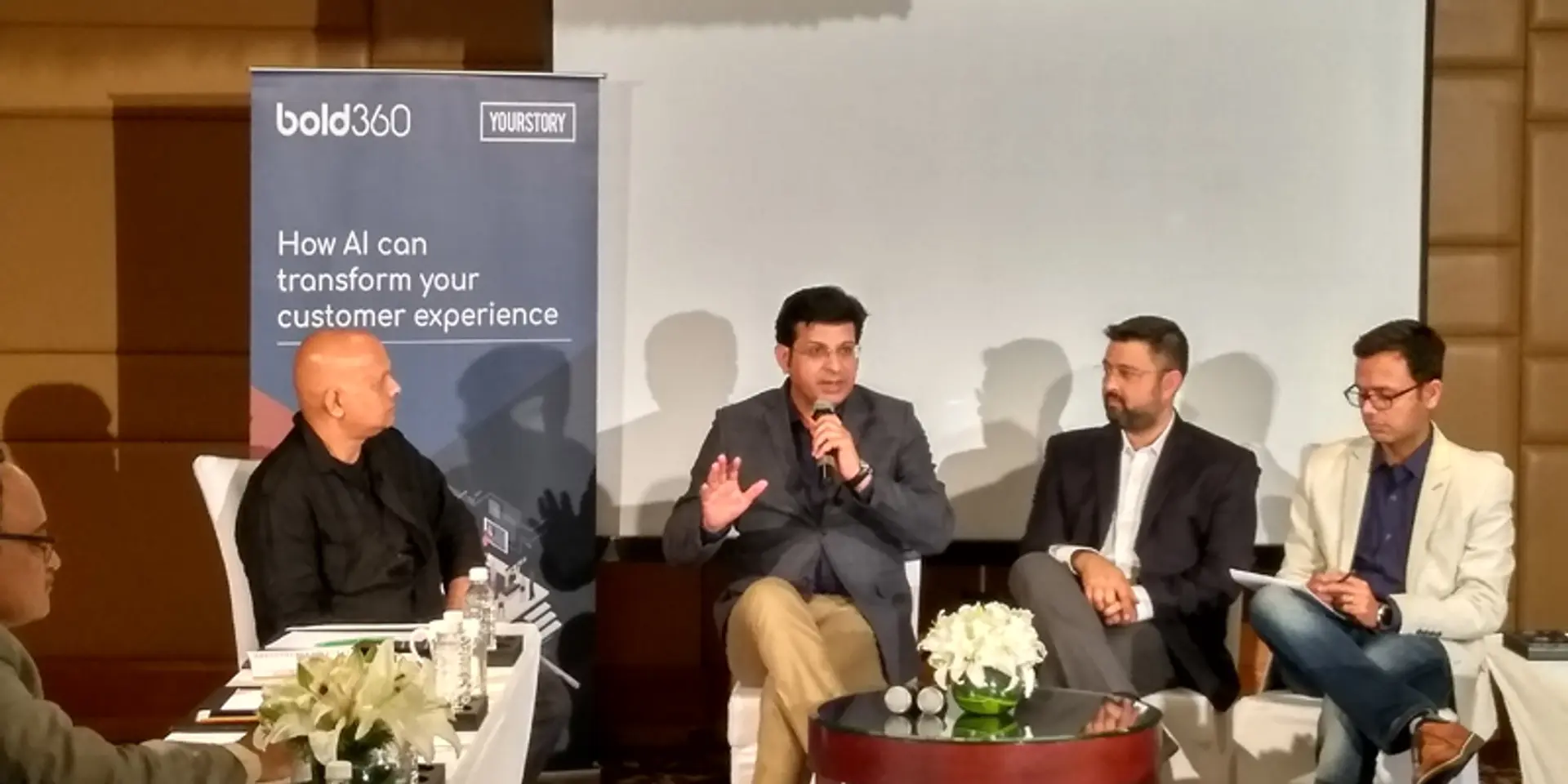
Bold360
View Brand PublisherCXOs share their take on putting AI at the core of product development, using AI to reinvent customer support
According to a 2017 industry report that surveyed nearly 1,000 companies using AI, nearly 59 percent of the companies using AI in India are beyond pilot and test projects and adopting the technology on a larger scale.
Today even the government is taking note of AI. In fact, in June this year, the NITI Aayog published a paper titled “National Strategy for Artificial Intelligence.” The paper recognised the potential of AI as an economic and social growth enabler and envisions setting up a research hub for AI related technologies.
A recent report on the adoption of AI in India released by the Indian Government identified 10 areas where the technology could add significant value. This includes manufacturing, fintech, healthcare, agriculture/ food processing, aid for differently abled/accessibility technology, public utility services, education, national security and retail/ customer engagement.
The recently-held LogMeIn Round Table in Bengaluru saw CXOs and business leaders from the startup ecosystem sharing their experiences on incorporating AI into their business and also defined some of the key tenants of a good AI platform.
How InMobi put zestful focus on integrating AI at the core of its products
Avi Patchava, Vice-President, Data Sciences & Machin Learning, InMobi, shared how the company orchestrated and accelerated an AI transformation journey in the last few months. The startup scaled up from a team of 12 data scientists to a 150 strong team and widened the AI focus to making it a core component for several product lines.
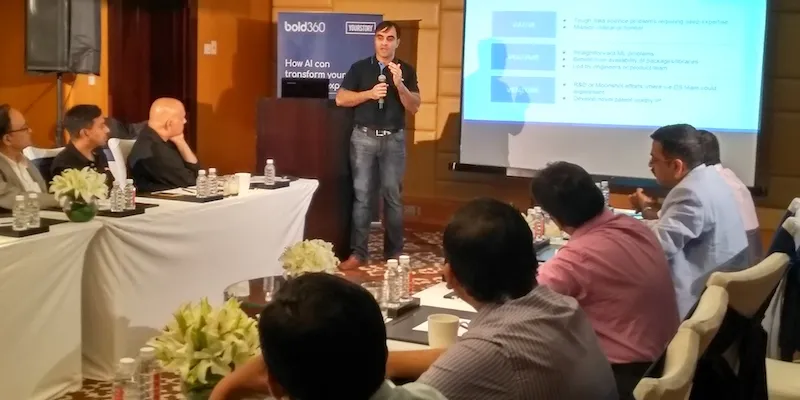
InMobi set itself a target of delivering 100 new uses by seamlessly integrating AI across InMobi products. “Every use case that we want to work on has to fit into one of three compartments – value use, volume use case or venture use case. The venture use case is primarily anything that involves R&D effort and delivers value to the organisation in the long term,” said Avi.
Working on this are a team of 100+ data scientists, engineers, and product leads who have been upskilled and trained at an in-house ML Academy. “Once we had a well-defined plan in place and built a team, we realised that the people had to be empowered with the right toolset. While there were a number of off-the-shelf tools that automate a number of routine AI tasks, we could not use these considering the scale that we were operating on – 1,00,000 requests per second. That’s when we decided to define and build an in-house end-to-end ML platform and enable our data scientists to be as efficient as possible,” he explained.
The result? In six months, the team has been able to build ML into the core of three key products – InMobi Pulse, a market research product, InMobi Glance, a content discovery application and Fraud Defence.
Reinventing customer support, operations management, and fraud management with AI
As one of the few B2C companies that decided not to have an IVR, BigBasket had a lofty goal: to ensure that every customer support call gets connected within in 10 seconds. According to Nagaraju KB, Chief Experience Officer, BigBasket, in the last six years they have achieved a 95 percent success rate in adhering to this goal.
“Our knowledge management system allows our agents to access FAQs and various processes in our customer support function while they are on the call. Just by keying in one or two contextual words, the agent can pull out a process document that helps resolve the query,” he said.
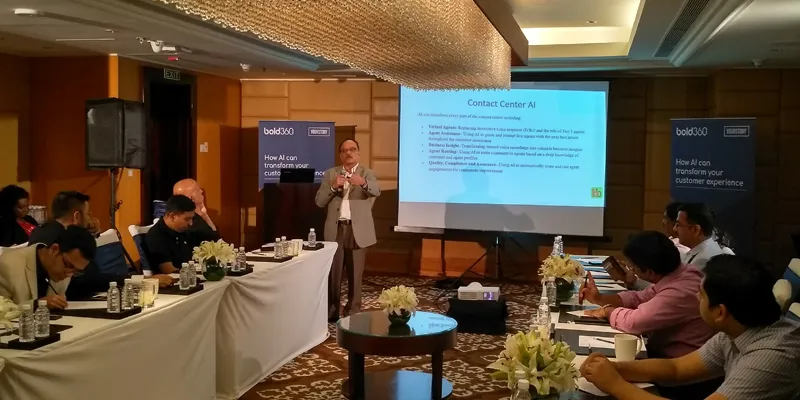
Nagaraju continues, “When we began this journey one and a half years ago, one of the things we asked ourselves was ‘how do we leverage AI and chatbots to reduce the need to scale our primary customer support agents?’” Today, a 16,000-strong workforce helps BigBasket execute over 2 million orders a month across 24 cities, of which 1,000 are customer support agents. “We realised that as we continue to scale up, it will be unsustainable to scale our customer support centre at the same pace. Also, there is a lot of churn when it comes to the customer support workforce. Today we are trying to see how best we can use AI to guide agents during a live customer support call by suggesting best possible actions or solutions for the query by looking at the customer’s history in split seconds. As we scale, we are also looking at the possibility of getting at least 80 percent call recordings audited through AI. In addition, AI can help us decipher the call data to give us better insights,” he said.
BigBasket is also looking to tap AI to achieve better workforce management. “For instance, by looking at the past history or trends, AI can predict the likelihood of absenteeism thereby help us be better prepared and responsive,” he said.
Today, AI is already playing a big role in detecting fraud at BigBasket. “It’s not uncommon to see a lot of B2B customers masquerading as B2C customers. There are some B2C customers trying to defraud us. Then there are genuine B2C customers who might order an unusually high number of SKUs. Our AI engine applies a fraud score on the fly and highlights the likelihood of a fraud even before the order is confirmed. In case a transaction is flagged as fraudulent, we immediately reach out to the customer over a call and investigate the authenticity,” he said.
7 principles of harmony to build an AI platform for enhanced customer support
Rahul Sharma, Managing Director - India & SAARC, LogMeIn, gave a detailed overview of the seven key principles of harmony, i.e the areas that a business organisation should focus on while building an AI platform for customer experience, to achieve harmony between bots and humans.
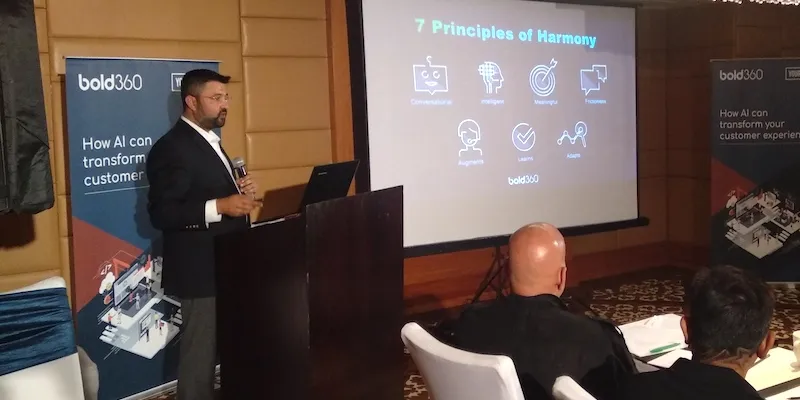
Principle number 1: The fundamental aspect of a good AI platform is that it has to be conversational. The platform has to seamlessly understand the numerous ways people communicate. For instance, if the chatbot spots a typographical error, it must contextually understand what the actual word could be and respond accordingly.
Principle number 2: It should be intelligent and be able to understand the context of the question you are asking and respond accordingly.
Principle number 3: It should provide a meaningful experience. This can be achieved by personalisation. Another way is to ensure that conversations should not be limited to answering queries but also facilitate real time and relevant transactions.
Principle number 4: The platform should facilitate seamless and contextual hand-off to a human agent whenever the need arises.
Principle number 5: A true AI platform should be able to assist internal agents in real time. This can help bridge gaps in the agents’ knowledge and make customer support more efficient.
Principle number 6: It should be able to learn on its own, capture new responses and collect feedback, thereby continuously expanding knowledge and boosting self-service.
Principle number 7: The AI platform must be able to adapt to a constantly changing environment, and should be able to create visual insights / dashboards, and enable business users to make changes in real time.
Panel discussion
In a panel discussion moderated by Madanmohan Rao, Research Director, YourStory, Sameer Dhanrajani, Chief Strategy Officer, Fractal Analytics; Ashley DSouza, VP, Swiggy and LogMeIn’s Rahul Sharma shared their views on trends related to AI.
Talking about metrics for measuring AI impact, Sameer said, “Unless you are measuring the impact of analytics in rupees or dollars, it nullifies the investment you are making in analytics.”
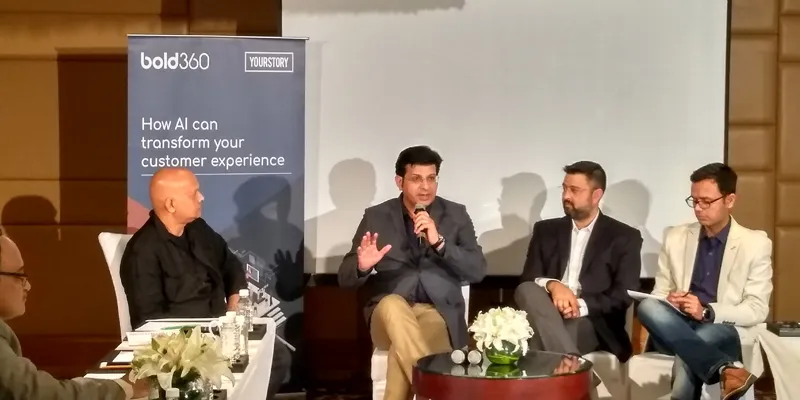
Ashley shared the relevance of AI for a consumer internet company like Swiggy and why AI will no longer be a competitive advantage but a technology that will be considered innate to the business. “Businesses like ours are susceptible to higher customer drop off when there is a delay in the transaction or a hitch in the service. We believe AI can help tremendously to improve segmentation marketing, communication and the likes. Then AI helps in improved decision-making, wherein decisions backed by data and prediction are taken in real time which enable the business to respond faster, in a more nuanced manner specific to the user.“
Responding to Madan’s question on who should own the AI function in a company, the three experts unanimously agreed that the ownership should be pervasive and embedded across all levels of the organisation and have a buy-in from both the technical and business sides.


